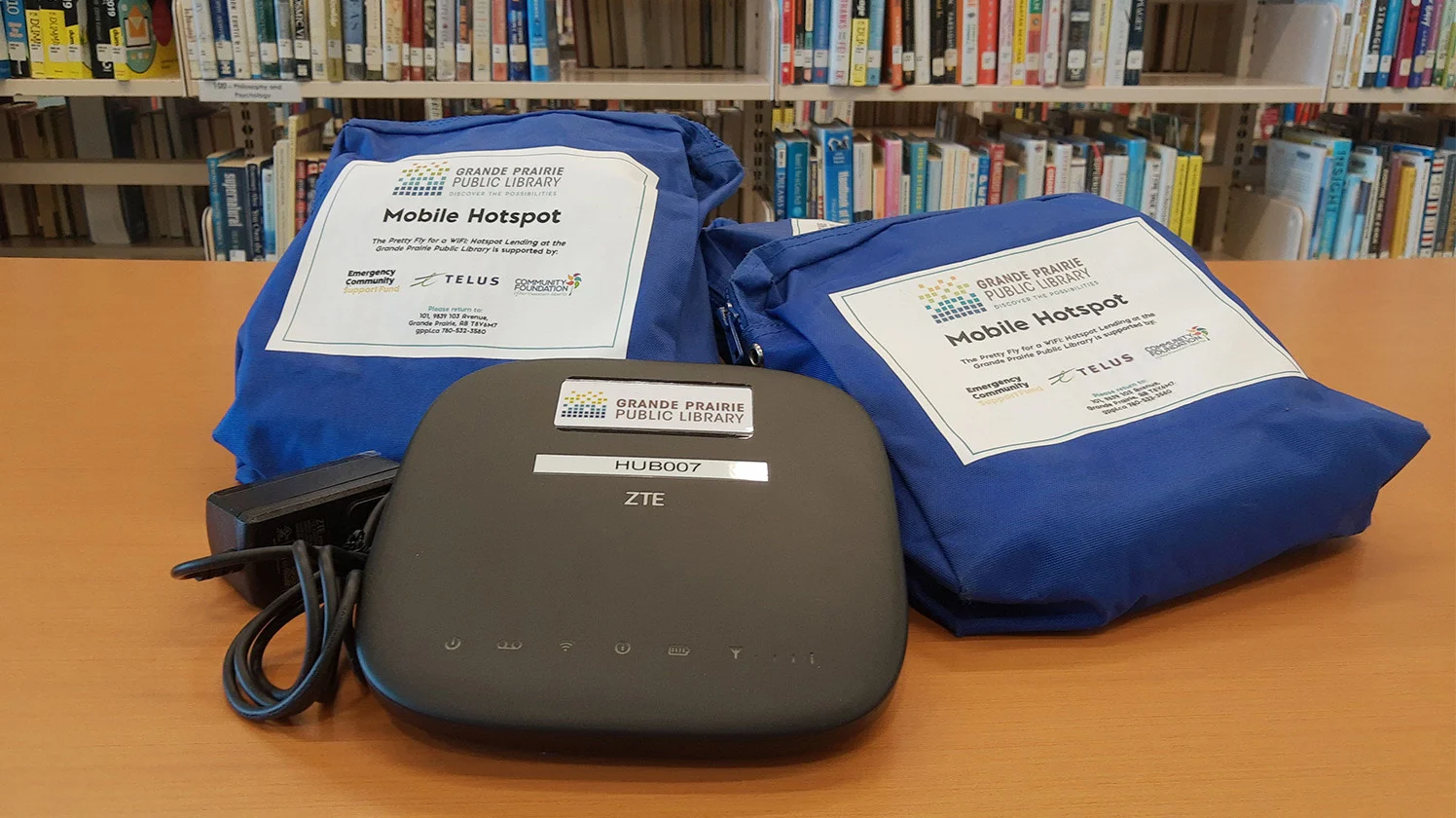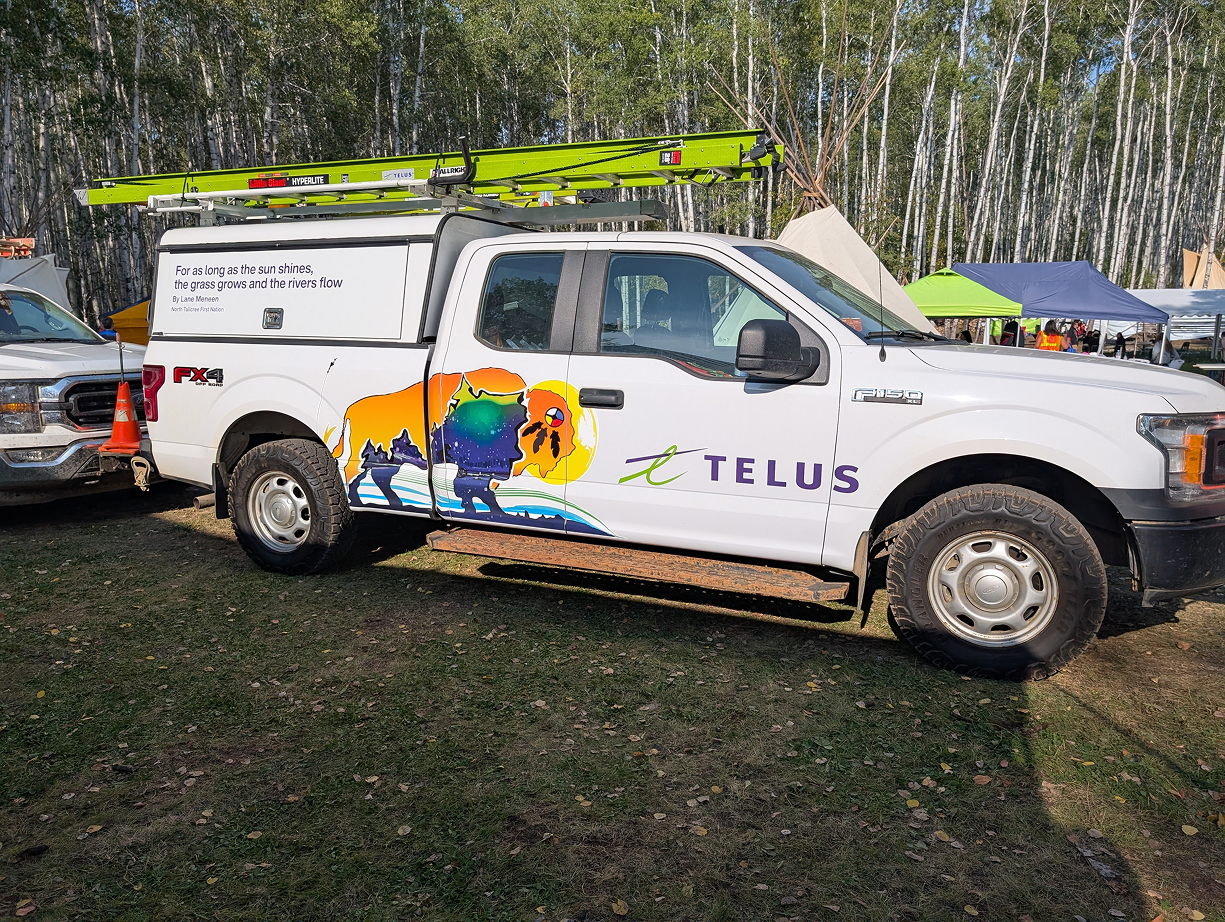
Connecting Canada
Internet lending program a game changer for rural connectivity | TELUS
Jun 20, 2023
Story was originally published on November 15, 2020 and updated June 20, 2023
It started at the end of a busy work day in 2016. Library staff at Alberta’s Parkland County walked out to the parking lot only to discover that it was full of people in their cars connecting to the wifi signal from beyond the facility’s locked doors.
The moment crystallized the extent of a distressing divide in the region: In an age when the vast majority of Canadians have access to some of the
fastest
and most reliable networks in the world, too many of their neighbours were being left behind. The realization sparked an innovative concept. What if the library system could lend out home internet connectivity like a book, in exchange for only a library membership?
After all, internet connectivity “is a huge resource for people,” says Haley Amendt, Librarian with the Sylvan Lake Library and program advocate. “We want everyone to have access to information, for whatever their digital needs are.”
Today, in partnership with TELUS, that idea has grown into a widespread movement that now involves over 200 libraries across Alberta and British Columbia, up from 50 libraries in 2020.
Almost 600
TELUS Smart Hubs
are being loaned out to library users who otherwise may not have ready access to the digital world, over double the amount three years ago. The Smart Hubs provide fixed high-speed internet access, no wires required. Making that connection is as simple as plugging the Smart Hub into a power socket, selecting the wifi name, and entering the password on the device.Of the devices on loan, 200 are being donated to the Grande Prairie Regional College this fall, to support distance learning.
“Libraries are all about serving people from all sorts of backgrounds and socio-economic levels, including those with marginalized backgrounds and new immigrants. It’s another way we show our community we care,” says Hailey McCullough, Head of Adult Services for
Grande Prairie Public Library
. 
For TELUS, the Smart Hub program is another expression of the company’s commitment to bridging the digital divide and ensuring all Canadians have access to the people, resources, and tools they need to succeed in an all-connected world. PHOTO SUBMITTED
For TELUS, it’s an expression of the company’s commitment to bridging the digital divide and ensuring all Canadians have access to the people, resources, and tools they need to succeed in an all-connected world.
“We always intended to grow these programs because they align so firmly with our objective to make the future friendly,” says Brian Bettis, TELUS General Manager, Customer Solutions Delivery for Northern Alberta and B.C.
"The equipment is easy to use because it foregoes the usual wired connection and provides a seamless wireless experience that is universally accessible,” says Bettis.
The Smart Hub capabilities rely on the powerful TELUS
wireless network
, which offer near-ubiquitous 4G LTE coverage available to 99.2 per cent of Canadians; and a transition to 5G is underway.And that connectivity is growing steadily. TELUS continues to increase both wireline and wireless internet capacity, even in the country’s
smallest communities
. The company’s 5G
network continues to expand across the country.Critically, the expansion of 5G is great news for Canada’s under-served small and rural communities. To date, connectivity to some communities has been challenging in a country whose natural beauty is matched only by its vast and difficult geography. As 5G continues to evolve and become more sophisticated, the acquisition of low-band spectrum — the invisible highway of airwaves that transmit data — will ensure Canadians, wherever they are, can reliably connect to their schools, jobs, medical professionals, and loved ones in ways that have previously not been possible.
And
with access to this spectrum
, Smart Hubs are an even more valuable tool for Canadians.“These devices are an epiphany for rural connectivity,” says Bettis.

Corey Chernuka and Hailey McCullough show off the new Smart Hub devices available to the public through the Grande Prairie Public Library. The internet lending program is “another way we show our community we care,” says McCullough. PHOTO SUBMITTED
Getting creative
Anonymous data gathered from the Smart Hub program shows most users are young families without internet access at home, students who need access to stronger internet, job seekers, and seniors.
The need for such a program has been brought into sharp focus by the pandemic, which has pushed students across the province into online learning, and compromised the ability for families to visit loved ones in hospitals and care homes, increasing the reliance on video calls.
“It’s not just about education. It’s about togetherness, staying connected, and allowing people to choose and stay where they live by giving them this connectivity,” says Bettis.
The Smart Hub program has evolved since its inception seven years ago.
The Parkland region, for instance, whose network of libraries cuts a swath across much of central Alberta, now uses its Smart Hubs to offer the internet to dozens of users at a time in places such as farmers’ markets, coffee shops, senior centres, and the Howard Buffalo Memorial Centre in the community of Maskwacis.
“It allows us to do outreach and offer library services outside of the library,” says Haley Amendt. “There are a lot of barriers that prevent people from coming to the library, so we take the virtual library to them.”
All Canadians deserve resilient and reliable high-speed internet access to connect them to what matters most.
In Grande Prairie, the demand for the portable wifi service has been greater than ever with the onset of the pandemic, given the resulting layoffs from companies closing.
“The need is there and we’re helping fill that,” says McCullough. “People love the program.”
Following the growth and interest from libraries, the program broadened, taking it into B.C.’s interior and west to Vancouver Island, with plans to expand nationally throughout 2024.
For TELUS, this is more than simply doing business.
“We believe in connecting all Canadians to what matters most, and we will continue to find creative solutions to achieve just that,” says Bettis. “It’s just the right thing to do.”
Explore similar articles

Help support connecting communities
Better government policies are needed to ensure connectivity for all Canadians.
Get informed

